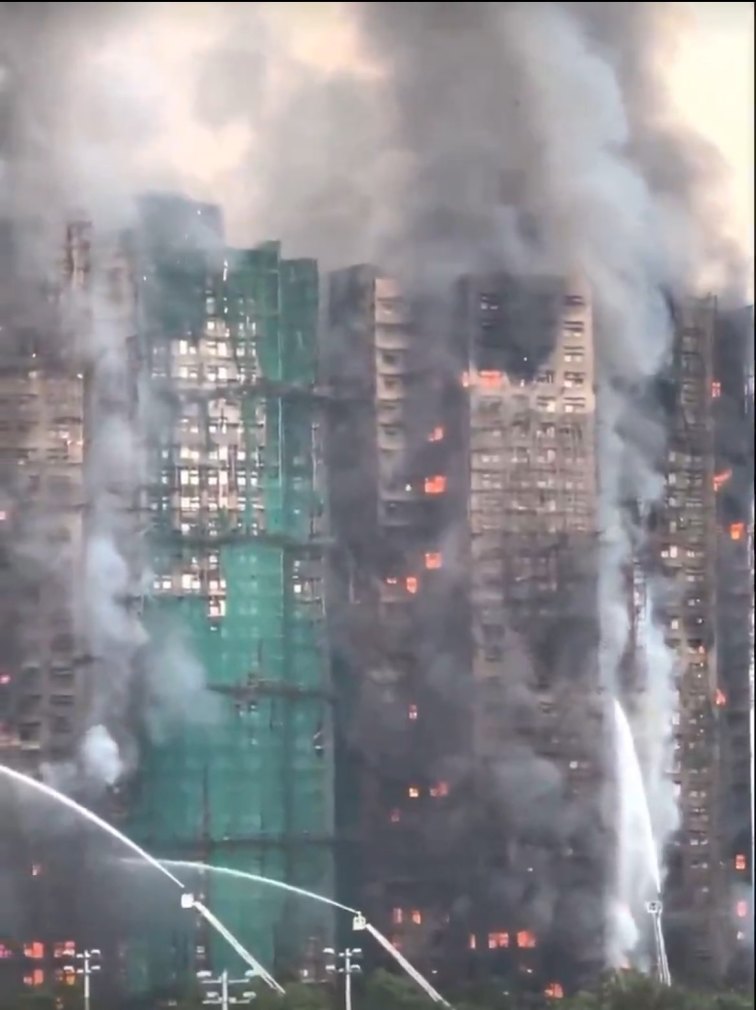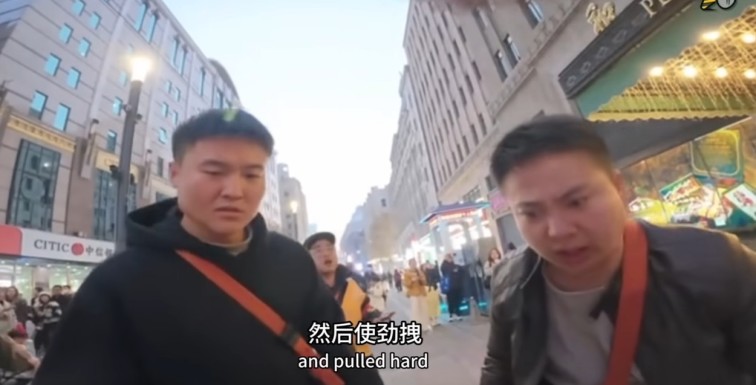On March 4, 2024, during the establishment of the military and armed police delegation at the Chinese Communist Party;s two sessions, He Weidong (left) and Miao Hua (right) were seated at the praesidium. (Video screenshot)
[People News] Former CCP Central Military Commission (CMC) vice chairman He Weidong and former Political Department director Miao Hua—who were confirmed in the communiqué of the CCP’s 20th Fourth Plenum in October to have been expelled from the Party and accused of “betraying loyalty” and “seriously undermining the principle of the Party commanding the gun and the system of the CMC chairman assuming full responsibility”—have now been officially deemed by the military to have committed crimes comparable to those of former CMC vice chairmen Xu Caihou and Guo Boxiong.
On November 25, the CCP’s military newspaper, under the CMC’s Strong Military Forum column, published an article titled “Completely and Thoroughly Cut Out Tumors, Purify Sources of Poison, and Eliminate Residual Toxicity.” The article begins by claiming that “corruption … is a cancerous tumor and governance challenge faced by all countries,” attempting to provide an excuse for the CCP’s worsening corruption problems despite its anti-corruption campaigns. It then cites a statement Xi Jinping made a few years ago at a Politburo study session: “Resolutely cut out tumors, eliminate the sources of poison, and cleanse residual toxicity.” This became the article’s title.
So what exactly is the “tumor”? The article defines it as “those corrupt individuals and corruption cases that seriously violate discipline and law and have great destructive impact.” These individuals “parasitize the body of the Party and the military,” and cutting them out is “the key first step in winning popular support and demonstrating determination.” The “source of poison” refers to “institutional loopholes that allow corruption to arise.” The article states that the “systemic cage” must be strengthened, but clearly, without independent oversight, the CCP can never fundamentally curb corruption.
Compared with “tumor” and “source of poison,” the article considers “residual toxicity”—“the political-ecological pollution and ideological residue formed after long-term contamination by corrupt behavior and its underlying erroneous notions”—to be “more hidden, more stubborn, and more harmful.” It then blames He Weidong and Miao Hua’s corruption cases on being “deeply influenced by Guo and Xu; their conduct and style were identical, even exceeding them in some respects.”
In other words, according to the CCP military, He Weidong and Miao Hua exhibited corruption behaviors and methods similar to Xu Caihou and Guo Boxiong, possibly even more severe. How can this be understood?
When Xu Caihou fell in 2014, the authorities revealed that his crimes included “using his position to help others obtain promotions, directly or through family members accepting bribes; using his influence to seek benefits for others, with family members accepting property in return, suspected of bribery crimes.” On April 5, 2016, CCP state media announced that military prosecutors had concluded the investigation of Guo Boxiong for suspected bribery and transferred the case for prosecution. On the same day, the PLA website published commentary accusing Guo Boxiong and Xu Caihou of inserting personal “private goods” into high-level decisions, meddling in decisions below their authority, practicing favoritism, selling ranks, amassing wealth, buying loyalty, and engaging in acts that “undermined the foundations of the Great Wall.”
Thus, He Weidong and Miao Hua are believed to have engaged in comparably serious misconduct. But whose “residual toxicity” are they accused of inheriting? That is difficult to say. In a military rife with corruption at every level, He and Miao did little more than what countless senior officers have done. The military’s effort to link He and Miao to Xu and Guo appears aimed at: (1) identifying a supposed source for their crimes to separate them from Xi Jinping and systemic faults, and (2) signaling something deeper, since in CCP political culture, “corruption” is often the universal charge used to eliminate political opponents or punish perceived disloyalty. The handling of He and Miao is fundamentally no different from the handling of Xu and Guo a decade earlier.
It is widely known that Guo Boxiong and Xu Caihou were key allies of the now-deceased Jiang Zemin within the military, as both were promoted by him. Whether during or after Jiang’s tenure, they served as Jiang’s agents in the military, carrying out his orders and weakening then-CMC chairman Hu Jintao. Backed by Jiang, Xu and Guo brazenly sold ranks and positions; under Jiang’s orders, the military also participated without hesitation in the atrocities of forced organ harvesting from Falun Gong practitioners. In this respect, Guo and Xu cannot be separated from Jiang Zemin.
Some may recall that after Zhou Yongkang was formally arrested in late 2014, CCP state media labeled him a “traitor,” while the military press called Xu Caihou a “national demon.” Such inflammatory terminology had not been used for any fallen officials in the two years following the 2012 CCP power transition.
Historically, those labeled “traitors” by the CCP include early leaders like Gu Shunzhang and Xiang Zhongfa, as well as Lin Biao, the “Gang of Four,” and later the rehabilitated Liu Shaoqi. Gu, Xiang, and others truly betrayed the CCP, while Liu Shaoqi, Lin Biao, and the “Gang of Four” were accused by top leaders of attempted “plots.” Thus, calling Zhou Yongkang a “traitor” implied not only betrayal of the CCP but also the widely known suspicion among CCP elites that Zhou had engaged in a coup plot.
By the same logic, comparing Xu Caihou to a “national demon” implied involvement in a coup alongside Zhou. On the same day the military published the article, Shanghai’s The Paper explained what makes someone a “national demon,” citing figures such as Wang Mang of the late Western Han—who feigned humility but harbored ambitions of usurpation—and Zhang Chunqiao of the Gang of Four. The article highlighted how such individuals create tumult and disaster.
In other words, the CCP leadership at the time sought to hint to the public—through labels like “traitor” and “national demon”—that Zhou Yongkang and Xu Caihou were involved in coup plots. Many analysts have long argued that Jiang Zemin’s faction, to preserve its power and avoid accountability for the persecution of Falun Gong, devised a plan to overthrow Xi Jinping, with Jiang, Bo Xilai, Zhou Yongkang, Xu Caihou, Guo Boxiong, and others involved. Because such charges cannot be publicly admitted by the CCP, they can only be alluded to through coded language and official rhetoric.
This implies that the sentences given to Xu and Zhou were based not only on the crimes publicly announced but also on charges that could not be disclosed. Military commentary at the time stated, “Senior cadres wield great influence; if they go astray, the consequences are not small. Their political problems are far more dangerous. The corruption of Guo Boxiong and Xu Caihou is shocking, but that is not their core issue—the core issue is that they crossed political red lines.”
Xu Caihou died of illness in 2015; thereafter, Zhou Yongkang and Guo Boxiong were both sentenced to life imprisonment. The CMC issued orders following Guo’s conviction demanding a campaign to purge remnants of the Guo–Xu faction, calling to “eradicate the roots.” Since Guo and Xu had effectively controlled the military for a decade, many mid- and high-level officers had ties to them. Subsequently, numerous senior military officials fell, and Xi used the opportunity to launch military reforms aimed at consolidating command over the armed forces.
After the 19th Party Congress, Xi Jinping indeed reached the apex of political power, becoming the unquestioned “Chairman Xi” to whom all generals professed allegiance. Unfortunately, Xi squandered his advantages. His attempts to protect the Party, his authority, and his position were accompanied by policy blunders, aggressive political control of the military, confrontational “wolf-warrior” diplomacy, and reckless threats to seize Taiwan—all of which triggered internal resistance across the Party and military. His public expulsion of Hu Jintao from the 20th Party Congress and the suspicious death of Li Keqiang, along with placing loyalists in the military and targeting even those like Zhang Youxia who helped him rise, contributed to a rapid weakening of his authority after last year’s Third Plenum.
Now the scenario once faced by Jiang’s protégés is repeating. Over the past year, Xi’s declining power has become increasingly evident. One key sign is the investigation, demotion, or weakening of his close allies. He Weidong and Miao Hua—his right-hand men in the military—are prime examples.
On November 13, the military newspaper, after publishing editorials last month criticizing “tigers” such as He Weidong and Miao Hua, again discussed their cases at length, emphasizing anti-corruption and political security, even using the rare phrase “before the gunshot rings,” warning that if “black sheep” are not eliminated in time, major political risks will result—and that the consequences at crucial moments “would be unimaginable.” This rhetoric is remarkably similar to that used after Xu and Guo were purged.
The article on the 25th tying He and Miao to Xu and Guo appears not only to accuse them of similar corruption but also to hint—implicitly—that they too were involved in coups or plots.
Recently, exiled CCP Central Party School professor Cai Xia revealed that the real reason behind the purge of He Weidong, Miao Hua, and many other generals may be tied to their alleged involvement in forming a “non-establishment force” in the Tianjin and Langfang regions—a so-called “private army.”
This extra-institutional force, after Xi’s loss of power, may have been intended to help Xi reclaim control of the military and even the Party. This would be intolerable to Zhang Youxia, who holds actual military authority, and to the CCP elders who control political direction, and it would be considered a “coup attempt.” Thus, the purge of He, Miao, and other military leaders is unsurprising—much like the purge of Xu and Guo, who supported Bo Xilai’s attempted coup.
This also means that the fate awaiting He and Miao is essentially the same as that of Xu and Guo. And as for Xi Jinping—who promoted them—he cannot truly separate himself from them. As his power continues to fade, what outcome could possibly await him?
(Source: The Dajiyuan)











News magazine bootstrap themes!
I like this themes, fast loading and look profesional
Thank you Carlos!
You're welcome!
Please support me with give positive rating!
Yes Sure!